Thanksgiving is a time for gratitude and reflection with family and friends, and there’s no room at the table—or under it—for a pet emergency or mishap. Check out Hearthstone Veterinary Hospital’s tips to ensure a happy, healthy, and safe Thanksgiving that everyone can be thankful for—including your pet.
Gather round the table—hazardous holiday foods for pets
The holiday table is a place for sharing heartwarming memories and hearty food—but without careful supervision, the table can become a cornucopia of catastrophe for pets. Many classic Thanksgiving dishes feature ingredients that are unsafe for pets and can cause numerous health emergencies, including:
- Toxicity — Toxic ingredients can trigger dangerous—sometimes life-threatening—side effects in pets. Items to watch out for include:
- Onions, leeks, and chives
- Garlic
- Yeast dough
- Raisins, currants, and grapes
- Chocolate
- Alcohol
- Macadamia nuts
- Xylitol (i.e., a sugar substitute found in sugar-free or keto-friendly baked goods, candy, gum, and snacks)
If you know or suspect that your pet has ingested a toxic ingredient, immediately contact Hearthstone Veterinary Hospital or the ASPCA Animal Poison Control Center. Clinical signs may be delayed up to 12 hours, so do not wait to see if your pet gets sick.
- Gastroenteritis — Thanksgiving is known for its centerpiece turkey and indulgent side dishes laden with salt, sugar, dairy, and fat. Unfortunately, these rich foods can irritate canine and feline digestive tracts and cause vomiting and diarrhea.
- Pancreatitis — Meat trimmings and other fatty foods can trigger pancreatitis, a severely painful, inflammatory condition. Dogs with acute pancreatitis may vomit, and have diarrhea, abdominal pain, and appetite loss, and will require hospitalization to prevent long-term damage to the surrounding organs.
Avoid pancreatitis by keeping your pet on their regular diet, and asking that guests refrain from feeding your pet from their plate.
- Intestinal obstruction — Curious pets may swallow oversized, indigestible meat bones, corn cobs, and inedible objects (e.g., food wrappers, containers) that become trapped in the upper or lower gastrointestinal tract, and can lead to serious illness (e.g., vomiting, diarrhea, lethargy) and abdominal pain. Without surgery, obstructions may lead to tissue and organ damage, or death.
You can protect your pet by:
-
- Securing all trash cans behind a barrier (e.g., a door or gate)
- Advising guests not to leave their plates unattended
- Restricting your pet’s access to the kitchen or food prep area to prevent counter-surfing
- Never feeding your pet meat bones
The big game—holiday pet exercise can reduce stress and improve behavior
The holidays can throw life’s normal rhythms and routines out of sync. Visitors, activities, and boisterous events in and around the home can make pets feel disoriented and unsure, and they may change behavior, such as constantly seeking attention, misbehaving, and altering their eating or elimination habits.
Daily physical exercise and social interactions let your pet “blow off steam” and experience endorphin-release, which boosts mood and promotes calmness. Active pets are more likely to rest and feel satisfied at home, ensuring better behavior and less risk for stress-related health issues (e.g., colitis, anorexia, feline urinary problems).
House rules—advise guests on appropriate pet interactions and safety
Whether you’re the host or a guest at this year’s Thanksgiving dinner, respect others by supervising your pet at all times, or confining them to a crate or small room. This protects your pet from mishaps and prevents them from frightening other guests who may not like pets.
If you’re hosting Thanksgiving at your home, ensure everyone knows your pet ground rules. Things to consider include:
- Room safety — Advise guests to keep their room doors closed or to store personal belongings—especially medications, gum, candy, food, and valuables—high up, out of pets’ reach.
- Positive interactions — Ask guests to respect your pet’s space while your pet is sleeping, eating, chewing on or playing with a toy, or eliminating. This tip is especially important for children, who are often injured trying to interact with a preoccupied pet.
- Comings and goings — Ask visitors to ensure they close doors and gates behind them to prevent your pet from escaping.
- Treat responsibly — Remind visitors that you do not allow table scraps for your pet. Instead, provide pet-safe holiday treats (e.g., pumpkin flavored biscuits, dehydrated chicken or turkey) for guests to give your pet.
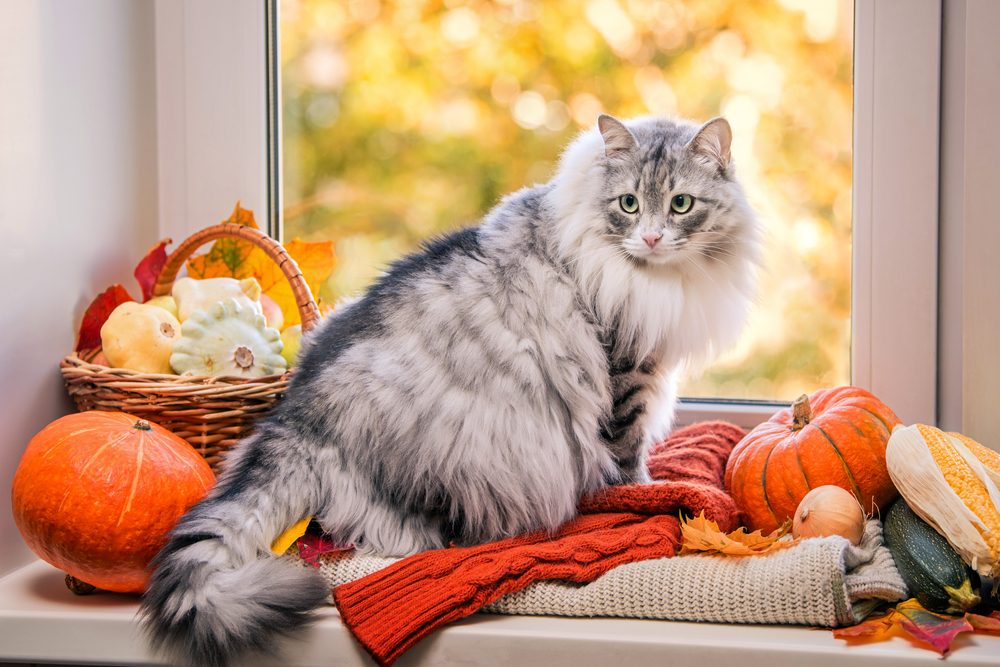
Tasteful decor—supervise your pet around festive decorations
Fall decorations may bring in the outdoors, but they can also bring trouble. Curious cats and nosy dogs may mistake your seasonal display for a sample platter of toys and treats. Hearthstone Veterinary Hospital recommends supervising your pet around decorations, and replacing traditional items with pet-safe alternatives.
- Corn stalks — Nothing says fall like corn stalks and decorative Indian corn. Unfortunately, corn cobs are a common cause of intestinal obstruction in pets.
- Gourds — Small gourds and pumpkins are cute on tabletops, but these ball-like items can result in choking and obstructions when chewed.
- Candles — Curious paws and wagging tails can spell disaster for candle-lit scenes. Prevent fires and burns by swapping traditional candles for flameless, battery-operated alternatives.
- Essential oils and liquid potpourri — Cats and dogs are highly sensitive to many essential oils, and absorption through inhalation, skin, or ingestion can cause serious respiratory issues or acute liver failure. Also, direct contact with heated products can cause serious burns.
- Fall bouquets — Many flowers are toxic to pets, including the perennial fall favorite, chrysanthemums. Check for toxic flowers or plants—especially lilies, which can cause acute kidney failure in cats—before displaying your floral arrangements.
As you and your loved ones gather around the Thanksgiving table this holiday season, ensure you remain grateful for your pet’s health and safety. Contact Hearthstone Veterinary Hospital for all of your pet’s health and care needs, such as their annual wellness check.


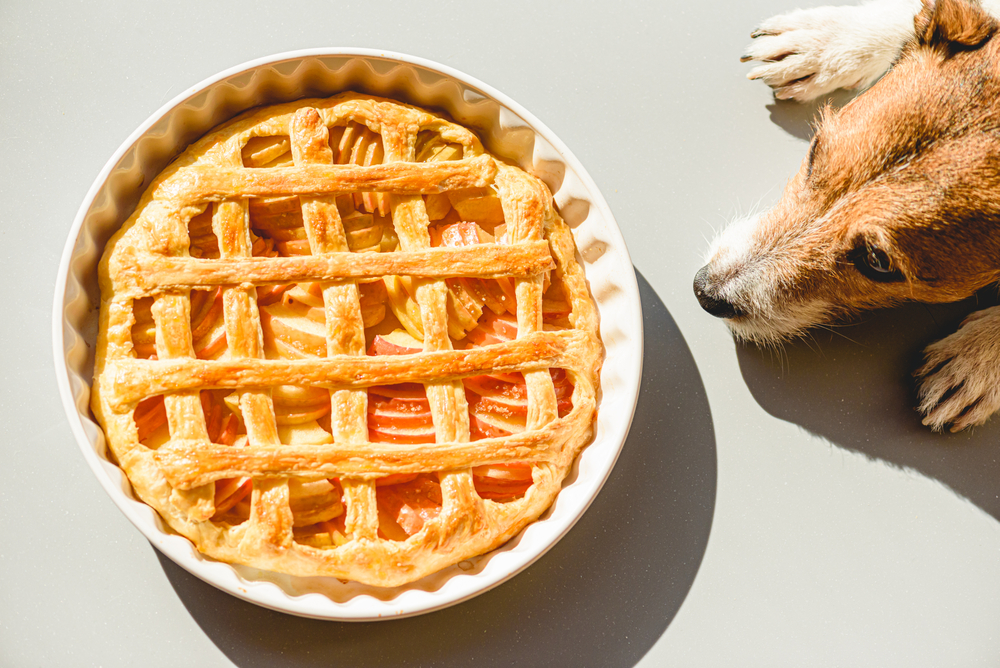
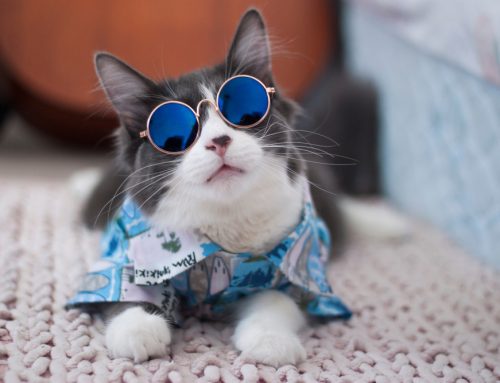
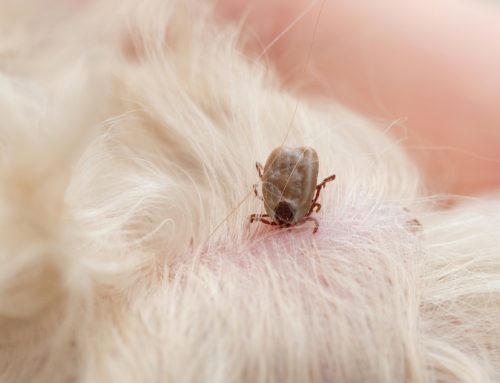
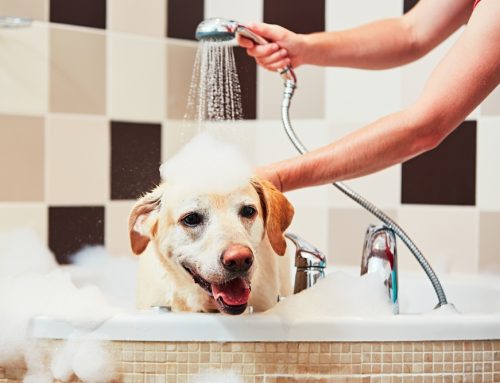
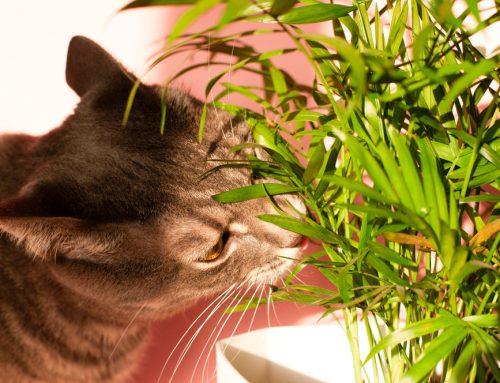
Leave A Comment